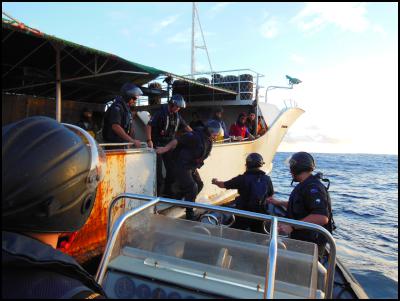Joint MPI and NZDF patrols protect South Pacific fish stocks
Joint MPI and NZDF patrols protect South Pacific fish stocks

The Ministry for Primary Industries (MPI) and the New Zealand Defence Force (NZDF) have just completed almost five weeks of fisheries patrols in the high seas of the South Pacific.
Compliance officers from MPI boarded and inspected 19 vessels during the operation, which was supported by Navy patrol vessel HMNZS OTAGO and a Royal New Zealand Air Force P-3K2 Orion surveillance aircraft.
Six of the 19 vessels inspected were found to be in breach of the conservation and management measures set by the Western and Central Pacific Fisheries Commission (WCPFC).
These breaches mostly related to vessels not reporting their catch as they should be. The WCPFC put in place these measures so the fish stocks and the associated marine environment are protected for years to come.
“These patrols support the management and safeguarding of the Pacific region’s valuable fisheries resources,” MPI Compliance Director Dean Baigent said.
“Both the NZDF and the MPI are very pleased with the successful outcome of these patrols,” Maritime Component Commander Commodore John Campbell said.
“By patrolling these waters, we are helping to clamp down on illegal, unreported and unregulated fishing which helps to protect the livelihoods of communities in Pacific Island countries as well as in New Zealand,” he added.
As the vessels were inspected in international waters, New Zealand had no authority to detain or arrest them. However, MPI reported any breaches back to the country the vessel is flagged to and the country is then required to investigate these breaches and report back to New Zealand and the WCPFC.
This year’s patrols covered international waters adjacent to the Exclusive Economic Zones of Australia, New Caledonia, Fiji, Matthew and Hunter Islands, Tonga, Niue, the Cook Islands and New Zealand.
The first phase of the patrols involved Australia, France and New Zealand and marked the first time the three countries conducted fisheries patrols together. The second stage was conducted in the high seas south of the Cook Islands and involved only New Zealand.
Between June and September each year, many foreign flagged vessels target the highly migratory fish species, predominantly tuna, in the waters adjacent to member-countries of the WCPFC.
The main target for many of the vessels that were inspected was albacore tuna which fetches approximately USD$1,200/tonne. They also land smaller amounts of yellowfin and bigeye which fetch higher market prices.
ends


 Gordon Campbell: On The Royal Commission’s Fine-tuning Of Vaccine Mandates And Lockdowns
Gordon Campbell: On The Royal Commission’s Fine-tuning Of Vaccine Mandates And Lockdowns Alcohol Healthwatch: Booze Delivered Quickly With Few Checks In Auckland
Alcohol Healthwatch: Booze Delivered Quickly With Few Checks In Auckland NZDF: Details From Interim Court Of Inquiry Report Into HMNZS Manawanui Incident Released
NZDF: Details From Interim Court Of Inquiry Report Into HMNZS Manawanui Incident Released Land Air Water Aotearoa: Ambitious Nationwide Initiative To Track And Share Actions To Improve Freshwater
Land Air Water Aotearoa: Ambitious Nationwide Initiative To Track And Share Actions To Improve Freshwater NZ Government: Chemical Weapons And Iranian Missiles Targeted In New Russia Sanctions
NZ Government: Chemical Weapons And Iranian Missiles Targeted In New Russia Sanctions Ministry For Culture And Heritage: Reverberations Of Erebus Disaster Still Felt 45 Years Later
Ministry For Culture And Heritage: Reverberations Of Erebus Disaster Still Felt 45 Years Later Watercare Services: No Cause For Concern After Slightly Elevated Levels Of Arsenic Detected In Treated Waikato River Water
Watercare Services: No Cause For Concern After Slightly Elevated Levels Of Arsenic Detected In Treated Waikato River Water


